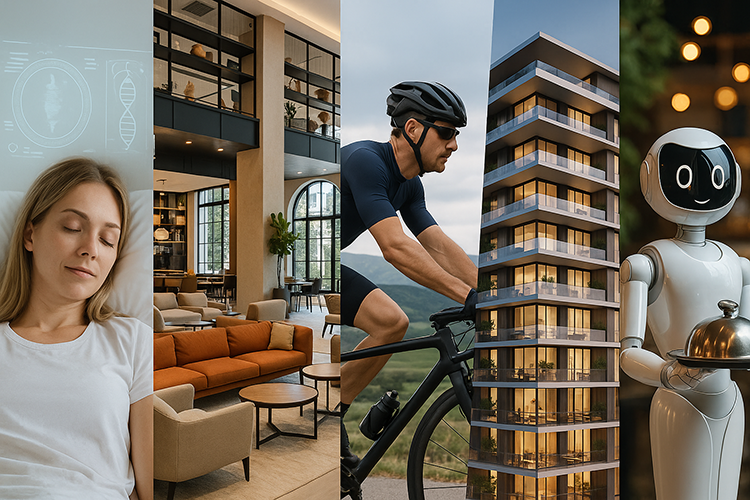Hospitality’s New Blueprint: From Longevity to Leadership, How Hotels Are Redefining Value
Europe’s hospitality sector is entering a new phase of transformation — one driven not just by travel demand, but by shifts in health, culture, technology, and finance. The modern hotel is no longer defined by occupancy rates or design trends; it is shaped by how well it adapts to a rapidly changing society. Across the continent, operators, investors, and developers are rethinking the meaning of hospitality and the sources of long-term value.
Health has quietly become the defining luxury of the new era. Hotel operators are investing heavily in longevity programs that merge medical science, data tracking, and holistic wellness. From sleep optimisation and nutritional diagnostics to integrated spa therapies, these experiences are designed to deliver measurable health outcomes rather than just relaxation. The model is proving financially viable, as guests increasingly pay significant premiums for wellness-focused stays. Yet the challenge remains whether such medically influenced hospitality can retain authenticity or if it risks turning well-being into another symbol of exclusivity.
At the same time, the hotel has become a stage for culture, retail, and community. The traditional lobby and restaurant are being redesigned as multifunctional spaces for locals and travellers alike. Many new hotels host art exhibitions, retail pop-ups, and culinary events that blur the boundaries between hospitality and urban culture. The food and beverage division, once considered secondary, now serves as a core identity driver. Operators are experimenting with a mix of in-house dining concepts and partnerships with independent chefs to strike the right balance between creative control and financial return. Those that succeed are turning their properties into social landmarks rather than transient spaces.
Another dynamic reshaping the industry is the rise of active and sports-based travel. Performance-driven holidays centred on cycling, hiking, or endurance training are becoming a reliable source of revenue, extending occupancy beyond traditional seasons. Hotels that align with fitness brands or sporting events are finding new pathways to profitability, particularly as travellers prioritise experiences that combine wellness with achievement. The growing intersection between sport, health, and leisure is transforming how resorts design facilities and how investors assess potential growth markets.
The rapid expansion of branded residences has emerged as both a solution and a risk within the development pipeline. Developers see the model as a way to generate liquidity while offering buyers the prestige and convenience of a managed lifestyle. Buyers, in turn, are drawn to the security and design standards associated with global hotel brands. Premiums can be high, but so can the risks if supply outpaces demand or if brand consistency falters. For now, the concept continues to attract investors who view it as a stabilising force, though analysts warn that speculative enthusiasm could inflate a new asset bubble.
The transformation of hospitality extends behind the scenes, where labour shortages, rising wages, and shifting migration policies are reshaping workforce strategies. Automation is becoming a vital support system, with robots and digital platforms handling logistics, cleaning, and certain guest services. Yet most industry leaders agree that technology should enhance rather than replace human contact. The modern hospitality team is smaller, more skilled, and increasingly reliant on digital systems that allow for real-time operations, predictive maintenance, and data-driven decision-making.
Future-proofing has become a strategic priority, not a design trend. Operators are rethinking sustainability to ensure buildings are flexible, energy-efficient, and adaptable to future uses. Heritage properties are being converted into modern, carbon-neutral hotels, while developers experiment with modular construction and smart-building systems. Leadership succession is also moving into focus, particularly for family-owned hotel groups preparing for generational transitions. The next wave of leadership is expected to prioritise innovation, diversity, and technological integration.
Behind these operational and design evolutions lies a shifting financial reality. Access to capital remains limited, with banks imposing stricter lending conditions and developers increasingly turning to private equity or joint-venture partnerships. Energy upgrades and environmental compliance are consuming larger shares of investment budgets. While transaction volumes remain subdued, activity is concentrated in resilient destinations such as Spain, Portugal, Croatia, Poland, and Slovenia, where tourism fundamentals remain strong.
Profitability is returning across the sector, but not evenly. Food, beverage, and wellness divisions are outperforming room revenue in many cases, reflecting a broader change in consumer priorities. For hotels to thrive, they must offer more than accommodation — they must deliver experiences that align with the rhythms of modern life.
In this new environment, success depends on adaptability. The future of hospitality will belong to those who can blend health science with cultural identity, digital efficiency with human empathy, and sustainability with long-term financial discipline. The industry’s challenge is no longer simply to fill rooms, but to create living ecosystems where people can work, rest, connect, and renew — places that make staying not just an experience, but a choice for well-being and meaning.









